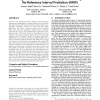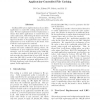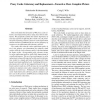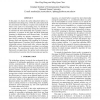103
click to vote
ISCA
2010
IEEE
15 years 16 days ago
2010
IEEE
Practical cache replacement policies attempt to emulate optimal replacement by predicting the re-reference interval of a cache block. The commonly used LRU replacement policy alwa...
121
click to vote
VLDB
2002
ACM
15 years 1 months ago
2002
ACM
This paper introduces MICP, a novel multiversion integrated cache replacement and prefetching algorithm designed for efficient cache and transaction management in hybrid data deli...
117
click to vote
OSDI
1994
ACM
15 years 3 months ago
1994
ACM
Traditional
le system implementations do not allow applications to control
le caching replacement decisions. We have implemented two-level replacement, a scheme that allows appl...
ICDCS
1999
IEEE
15 years 6 months ago
1999
IEEE
This work studies the interaction of Web proxy cache coherency and replacement policies using trace-driven simulations. We specifically examine the relative importance of each typ...
123
click to vote
INFOCOM
2002
IEEE
15 years 7 months ago
2002
IEEE
– Efficient data retrieval in a peer-to-peer system like Freenet is a challenging problem. In this paper we study the impact of cache replacement policy on the performance of Fre...
140
click to vote
WIRI
2005
IEEE
15 years 7 months ago
2005
IEEE
Caching Web objects has become a common practice towards improving content delivery and users’ servicing. A Web caching framework is characterized by its cache replacement polic...
116
click to vote
ICMCS
2005
IEEE
15 years 7 months ago
2005
IEEE
Recent technology advances in multimedia communication have ushered in a new era of personal communication. Users can ubiquitously access the Internet via various mobile devices. ...
159
click to vote
ISCA
2006
IEEE
15 years 8 months ago
2006
IEEE
Performance loss due to long-latency memory accesses can be reduced by servicing multiple memory accesses concurrently. The notion of generating and servicing long-latency cache m...
115
click to vote
ICMCS
2006
IEEE
15 years 8 months ago
2006
IEEE
In this paper, we discuss the cache replacement policy in a multimedia transcoding proxy. Unlike the cache replacement for conventional web objects, to replace some elements with ...
157
click to vote
ECRTS
2006
IEEE
15 years 8 months ago
2006
IEEE
Cache memories have been extensively used to bridge the gap between high speed processors and relatively slower main memories. However, they are sources of predictability problems...




